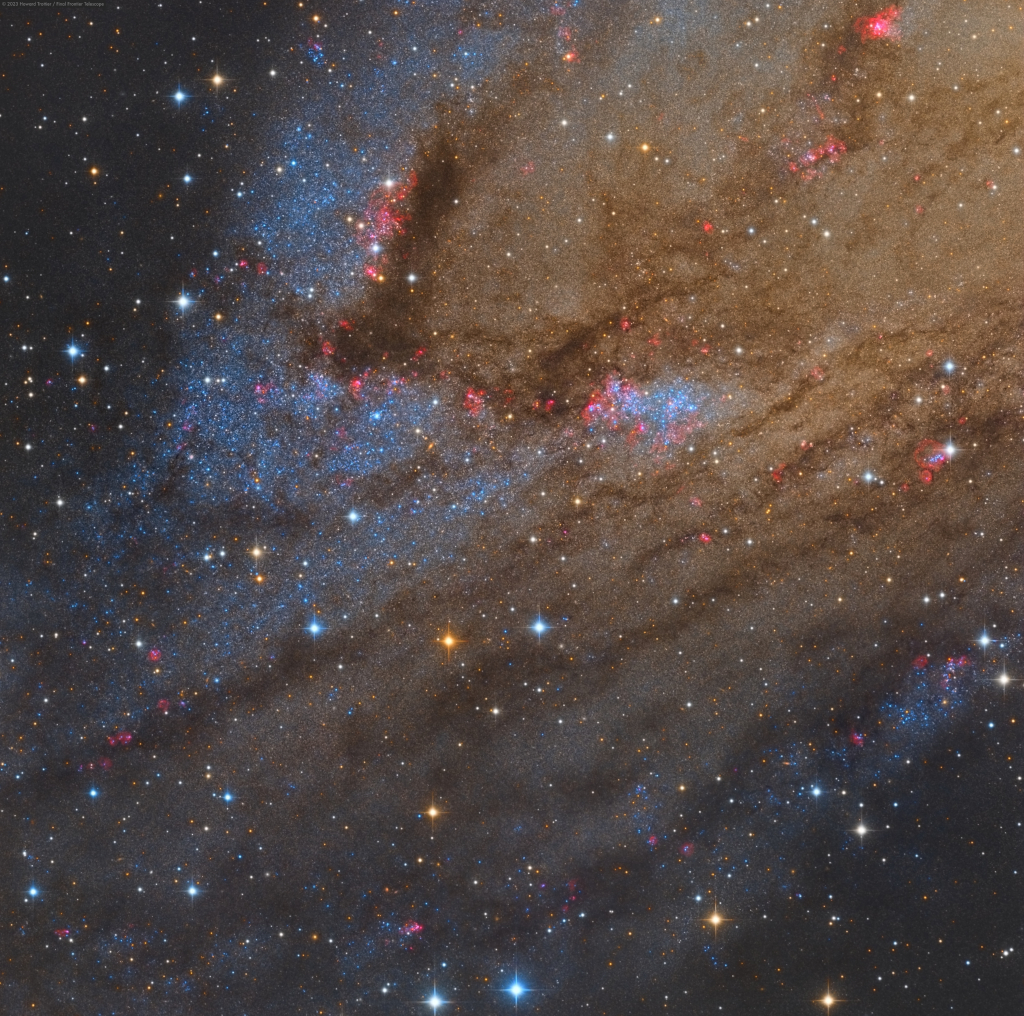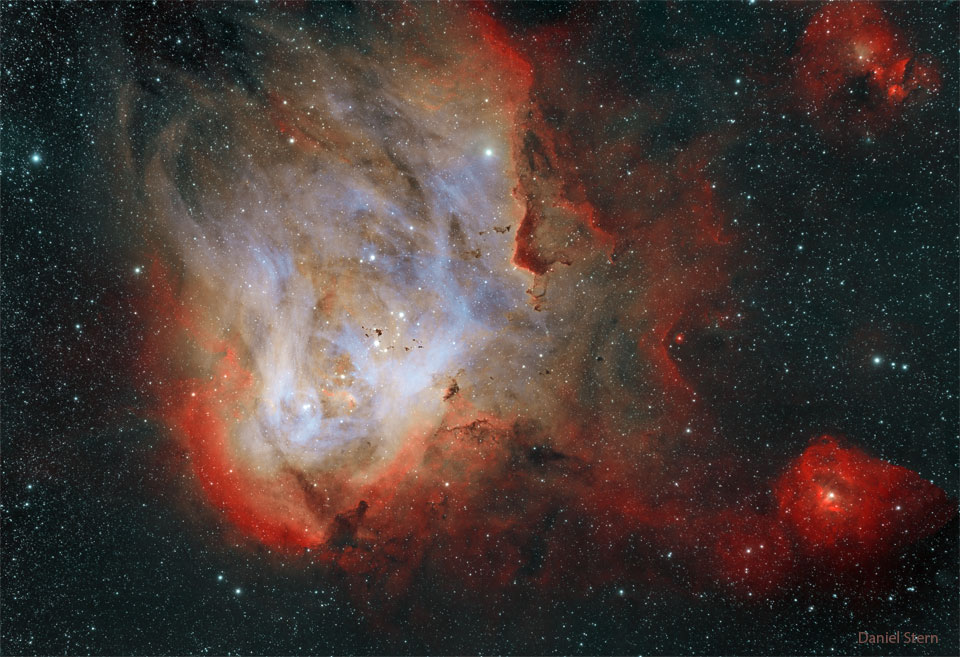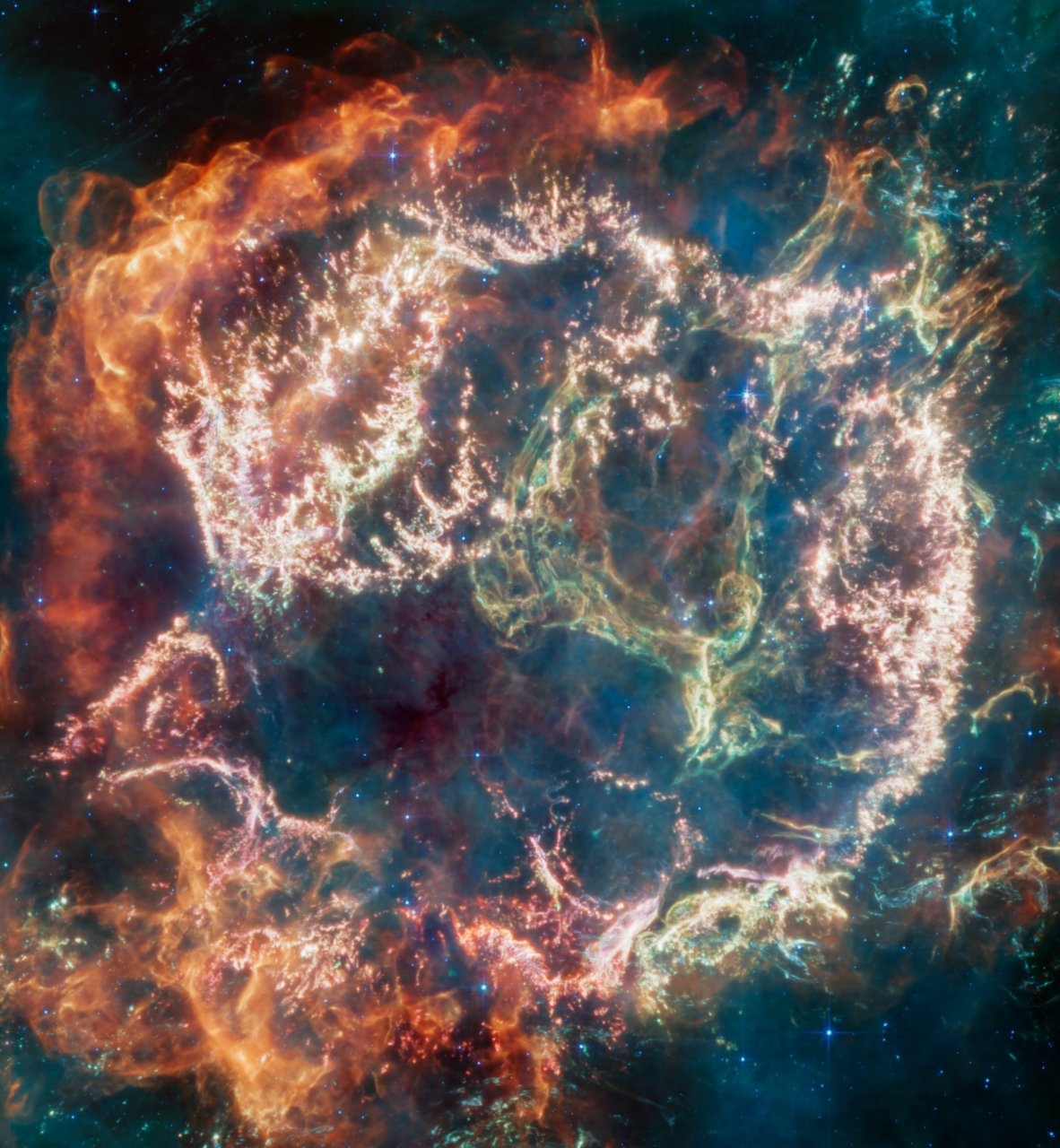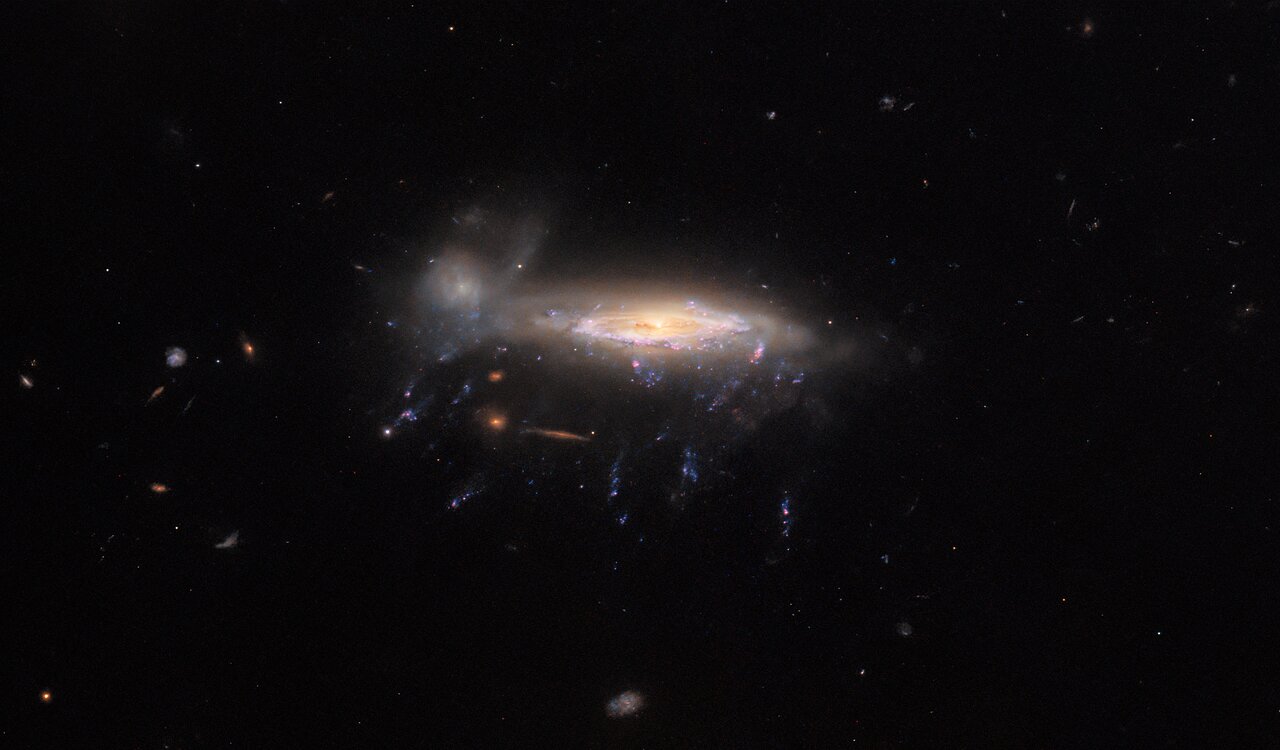Blog
The large stellar association cataloged as NGC 206 is nestled within the dusty arms of the neighboring Andromeda galaxy along with the galaxy’s pinkish star-forming regions. Also known as M31, the spiral galaxy is a mere 2.5 million light-years away. NGC 206 is found right of center in this sharp and detailed close-up of the southwestern extent of Andromeda’s disk. The bright, blue stars of NGC 206 indicate its youth. In fact, its youngest massive stars are less than 10 million years old. Much larger than the open or galactic clusters of young stars in the disk of our Milky Way galaxy, NGC 206 spans about 4,000 light-years. That’s comparable in size to the giant stellar nurseries NGC 604 in nearby spiral M33 and the Tarantula Nebula in the Large Magellanic Cloud.

Lowell Thomas George (April 13, 1945 – June 29, 1979) was an American singer, songwriter, multi-instrumentalist, and record producer, who was the primary guitarist, vocalist, songwriter and founder/leader for the rock band Little Feat.
Lowell George was born in Hollywood, California, the son of Willard H. George, a furrier who raised chinchillas and supplied furs to the movie studios.
more...John William “Jack” Casady (born April 13, 1944) is an American bass guitarist, best known as a member of Jefferson Airplane and Hot Tuna. Jefferson Airplane became the first successful exponent of the San Francisco Sound. Singles including “Somebody to Love” and “White Rabbit” charted in 1967 and 1968. Casady, along with the other members of Jefferson Airplane, was inducted into the Rock and Roll Hall of Fame in 1996.
Casady was born in Washington D.C., the son of Mary Virginia (née Quimby) and William Robert Casady. His father was of half Irish Protestant and half Polish Jewish ancestry. His mother was a relative of aviator Harriet Quimby; some of her family had been in North America since the 1600s.
First playing as a lead guitarist with the Washington, D.C.-area rhythm and blues band The Triumphs, he switched to bass during his high school years, and while still underage (and with a forged I.D.) played the Washington D.C. club scene, backing artists such as Little Anthony and the Imperials.
more...Albert Leornes Greene (born April 13, 1946), known professionally as Al Green, is an American singer, songwriter, pastor and record producer best known for recording a series of soul hit singles in the early 1970s, including “Take Me to the River“, “Tired of Being Alone“, “I’m Still in Love with You“, “Love and Happiness“, and his signature song, “Let’s Stay Together“. After his girlfriend died by suicide, Green became an ordained pastor and turned to gospel music. He later returned to secular music. Green was inducted into the Rock and Roll Hall of Fame in 1995. He was referred to on the museum’s site as being “one of the most gifted purveyors of soul music”. He has also been referred to as “The Last of the Great Soul Singers”. Green is the winner of 11 Grammy Awards, including the Grammy Lifetime Achievement Award. He has also received the BMI Icon award and is a Kennedy Center Honors recipient. He was included in the Rolling Stone list of the 100 Greatest Artists of All Time, ranking at No. 65, as well as its list of the 100 Greatest Singers, at No. 14.
Albert Leornes Greene was born on April 13, 1946, in Forrest City, Arkansas.
more...Dub and reggae pioneer Jah Shaka has died, his family have confirmed.
Fans said the singer, producer and label owner also known as Zulu Warrior was “the greatest soundman that ever lived”.
Shaka was at the helm of sound system culture in London, releasing some of the scene’s most seminal records and spearheading the influential Jah Shaka Sound System, which he began operating and touring in the 1970s.
more...A gaseous nebula where star formation takes place. Cataloged as IC 2944, the Running Chicken Nebula spans about 100 light years and lies about 6,000 light years away toward the constellation of the Centaur (Centaurus). The featured image, shown in scientifically assigned colors, was captured recently in a 16-hour exposure over three nights. The star cluster Collinder 249 is visible embedded in the nebula’s glowing gas. Although difficult to discern here, several dark molecular clouds with distinct shapes can be found inside the nebula.

Herbert Jeffrey Hancock (born April 12, 1940) is an American jazz pianist, keyboardist, bandleader, and composer. Hancock started his career with trumpeter Donald Byrd‘s group. He shortly thereafter joined the Miles Davis Quintet, where he helped to redefine the role of a jazz rhythm section and was one of the primary architects of the post-bop sound. In the 1970s, Hancock experimented with jazz fusion, funk, and electrostyles, using a wide array of synthesizers and electronics. It was during this period that he released perhaps his best-known and most influential album, Head Hunters.
Hancock’s best-known compositions include “Cantaloupe Island“, “Watermelon Man“, “Maiden Voyage“, and “Chameleon“, all of which are jazz standards. During the 1980s, he enjoyed a hit single with the electronic instrumental “Rockit“, a collaboration with bassist/producer Bill Laswell. Hancock has won an Academy Award and 14 Grammy Awards, including Album of the Year for his 2007 Joni Mitchell tribute album River: The Joni Letters, becoming only the second jazz album to win the award after Getz/Gilberto in 1965.
Since 2012, Hancock has served as a professor at the University of California, Los Angeles, where he teaches at the UCLA Herb Alpert School of Music. He is also the chairman of the Herbie Hancock Institute of Jazz (formerly known as the Thelonious Monk Institute of Jazz until 2019).
Hancock was born in Chicago, the son of Winnie Belle (née Griffin), a secretary, and Wayman Edward Hancock, a government meat inspector. His parents named him after the singer and actor Herb Jeffries. He attended Hyde Park High School. Like many jazz pianists, Hancock started with a classical education. He started playing piano when he was seven years old, and his talent was recognized early. Considered a child prodigy, he played the first movement of Mozart‘s Piano Concerto No. 26 in D Major, K. 537 (Coronation) at a young people’s concert on February 5, 1952, with the Chicago Symphony Orchestra (led by CSO assistant conductor George Schick) at age 11.
more...Johnny Dodds (; April 12, 1892 – August 8, 1940) was an American jazz clarinetist and alto saxophonist based in New Orleans, best known for his recordings under his own name and with bands such as those of Joe “King” Oliver, Jelly Roll Morton, Lovie Austin and Louis Armstrong. Dodds was the older brother of the drummer Warren “Baby” Dodds, one of the first important jazz drummers. They worked together in the New Orleans Bootblacks in 1926. Dodds is an important figure in jazz history. He was the premier clarinetist of his era and, in recognition of his artistic contributions, he was posthumously inducted into the Jazz Hall of Fame. He has been described as “a prime architect in the creation of the Jazz Age.”
Dodds was born in Waveland, Mississippi. His childhood environment was a musical one. His father and uncle were violinists, his sister played a melodeon, and in adolescence Johnny sang high tenor in the family quartet. According to legend, his instrumental skill began with a toy flute which had been purchased for his brother, Warren “Baby” Dodds. He was known for his serious and reserved manner as well as his “funky blues playing,” which earned him the nickname “toilet.
more...Theodore Roosevelt “Hound Dog” Taylor (April 12, 1915 – December 17, 1975) was a Chicago bluesguitarist and singer.
Taylor was born in Natchez, Mississippi, in 1915, though some sources say 1917. He first played the piano and began playing the guitar when he was 20. He moved to Chicago in 1942.
Taylor had a condition known as polydactylism, which resulted in him having six fingers on both hands. As is usual with the condition, the extra digits were rudimentary nubbins and could not be moved. One night, while drunk, he cut off the extra digit on his right hand using a straight razor.
He became a full-time musician around 1957, but remained unknown outside the Chicago area, where he played small clubs in black neighborhoods and at the open-air Maxwell Street Market. He was known for his electrified slide guitar playing (roughly styled after that of Elmore James), his cheap Japanese Teiscoguitars, and his raucous boogie beats. In 1967, Taylor toured Europe with the American Folk Blues Festival, performing with Little Walter and Koko Taylor.
https://www.youtube.com/watch?v=8ueJQiwaVoA
more...Will Wampach Day
William Wampach (April 11 1951) Born St Cloud, MN. Mostly know as a Electric Guitarist also a songwriter, painter, sculptor and artist. Growing up in Brooklyn Center, Mn. Will worked with bands like Blackbone, Angry Souls, The Mystic Evolution, CCLC. Later Will delved into Calypso and Reggae with Lloyd Cordner in Macumba, later working with Peter Nelson in Shangoya touring Trinidad. Will then became guitarist in the Maroons a Minneapolis based premier Rock Steady/Reggae group blending R&B, Rock and Human Rights issues.
Cassiopeia A (Cas A) is a supernova remnant located about 11,000 light-years from Earth in the constellation Cassiopeia. It spans approximately 10 light-years. This new image uses data from the James Webb Space Telescope’s Mid-Infrared Instrument (MIRI) to reveal Cas A in a new light. “Cas A represents our best opportunity to look at the debris field of an exploded star and run a kind of stellar autopsy to understand what type of star was there beforehand and how that star exploded,” Danny Milisavljevic of Purdue University in Indiana, principal investigator of the Webb program that captured the new observations, said in a NASA statement on Friday (April 7 2023).

more...
John Levy (April 11, 1912 – January 20, 2012) was an American jazz double-bassist and businessman.
Levy was born in New Orleans, Louisiana. In 1944, he left his family home in Chicago, Illinois, and moved to New York City where he played bass for such jazz musicians as Ben Webster, Erroll Garner, Milt Jackson, and Billie Holiday. In 1949, he became the bassist in the original George Shearing Quintet, where he also acted as Shearing’s road manager. In 1951, Levy opened John Levy Enterprises, Inc., becoming the first African-American personal manager in the pop or jazz music field. By the 1960s, Levy’s client roster included Shearing, Nancy Wilson, Cannonball Adderley, Joe Williams, Shirley Horn, Soul singer Jimmie Raye, and Ramsey Lewis.
In 1997, Levy was inducted into the International Jazz Hall of Fame, and in 2006 he was named a Jazz Master by the National Endowment for the Arts.
He died on January 20, 2012, aged 99, in Altadena, California.
more...b. 11 April 1913, Ellendale, Tennessee, USA, d. 22 August 1979, Chicago, Illinois, USA. Granderson left home when he was in his teens, moving to Chicago, Illinois, in 1928. Although not a professional musician, he did work with John Lee ‘Sonny Boy’ Williamson, among others. He turned to music full-time in the 60s and was featured as sideman and leader on many anthologies, although he never made a full album in his own right. Granderson sang and played guitar close to the style of the Memphis musicians of his youth. He stopped performing in public in 1975 and died of cancer in 1979.
more...Here we see JO204, a ‘jellyfish galaxy’ so named for the bright tendrils of gas that appear in this image to be drifting lazily below JO204’s bright central bulk. The galaxy lies almost 600 million light-years away in the constellation Sextans. This image was captured by the NASA/ESA Hubble Space Telescope, and it is the third of a series of Pictures of the Week featuring jellyfish galaxies. This series of images is possible thanks to a survey in which observations were made of six of these fascinating galaxies, including JO204. This survey was performed with the intention of better understanding star formation under extreme conditions. Given the dreamy appearance of this image, it would be understandable to wonder why jellyfish galaxies should be such a crucible for star formation. The answer is that — as is often the case with astronomy — first appearances can be deceiving. Whilst the delicate ribbons of gas beneath JO204 may look like floating jellyfish tentacles, they are in fact the outcome of an intense astronomical process known as ram pressure stripping. Ram pressure is a particular type of pressure exerted on a body when it moves relative to a fluid. An intuitive example is the sensation of pressure you experience when you are standing in an intense gust of wind — the wind is a moving fluid, and your body feels pressure from it. An extension of this analogy is that your body will remain whole and coherent, but the more loosely bound things — like your hair and your clothes — will flap in the wind. The same is true for jellyfish galaxies. They experience ram pressure because of their movement against the intergalactic medium that fills the spaces between galaxies in a galaxy cluster. The galaxies experience intense pressure from that movement, and as a result their more loosely bound gas is stripped away. This gas is mostly the colder and denser gas in the galaxy — gas which, when stirred and compressed by the ram pressure, collapses and forms new stars in the jellyfish’s beautiful tendrils.

more...
More Posts
- World Music Feyzullah Çınar
- Daily Roots Dillinger
- Otis Clay
- Little Johnny Taylor
- Josh White
- Happy Birthday Sadie
- Cosmo IC 417/NGC 1931
- Didiwe Lockwood
- George Winston
- Sérgio Mendes
- World Music Yma Sumac
- Daily Roots Queen Tiney & Agrovators
- Echoes of Freedom W. E. B. Dubois
- Lying Illusion
- Woody Guthrie Laws
- Walter Perkins
- Cosmo 30 Doradus
- Jerry Goldsmith
- Rufus Reid
- Manu Dibango